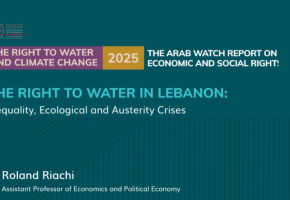
A Region on Fire
Issue 60 - November 25, 2024
As bombs continue to fall, there is local and international anticipation for a solution within hours!
Sources from the U.S., France, Israel, and Lebanon say there is positive progress in the ceasefire talks between Lebanon and Israel. Some expect an announcement in the next few hours or, at most, a few days. This is happening during heavy Israeli airstrikes across Lebanon, suggesting the intense attacks are a final push to get better terms before announcing a ceasefire.
If these predictions are true, the details of the agreement are still not public in Lebanon. The government has stayed silent, even though it’s responsible for announcing Lebanon’s position. American and Israeli sources say the agreement is for a temporary 60-day ceasefire to test both sides’ commitment while negotiating further steps. Some parts of the agreement are still unclear, and how it will impact Lebanon after the ceasefire is unknown.
Despite the hopeful mood, the U.S. government hasn’t confirmed anything yet. They are waiting for Israel’s government to officially approve the deal. Lebanon has already agreed informally, outside of official channels.
Battlefield Developments in Lebanon
Israeli warplanes launched intense airstrikes on the southern suburbs of Beirut, as well as several towns and villages in the south and Beqaa regions, causing significant destruction and casualties. The Israeli army issued evacuation orders for the village of Halta in southern Lebanon, urging residents to move north of the Awali River. It also gave several evacuation warnings for areas in Tyre, Nabatiyeh, and the southern suburbs of Beirut before heavily bombing them. An Israeli airstrike also hit the Choueifat area. Throughout the evening, Israeli threats and airstrikes continued in the Beqaa, the southern suburbs, and the south. Ground clashes persisted, with the fiercest fighting occurring in the Khiyam area and the Maroun al-Ras-Ainata-Bint Jbeil triangle, as well as along the Shamaa-Bayyada axis.
Hezbollah continued targeting Israeli military gatherings in various Lebanese villages and settlements in northern Israel, firing rockets deeper into Israeli territory. Israeli media reported the launch of 10 rockets from Lebanon toward the Golan Heights.
Political Developments in Lebanon
Reports from international, regional, and local sources suggest progress on a ceasefire between Lebanon and Israel, with an announcement expected soon. Key updates include:
- The White House said that talks led by envoy Amos Hochstein on a ceasefire between Israel and Hezbollah were positive and moving in the right direction.
- White House National Security Council spokesperson John Kirby stated, "We are close to a ceasefire in Lebanon."
- The French presidency confirmed significant progress in the ceasefire talks, shortly after senior Lebanese sources suggested that U.S. President Joe Biden and French President Emmanuel Macron might announce a ceasefire within 36 hours.
- Israel’s Channel 14 reported that France will join the monitoring mechanism for the agreement with Lebanon, with further progress expected soon.
- "Axios" reported that U.S. and Israeli officials expect the Israeli Cabinet to approve the ceasefire with Lebanon on Tuesday. The U.S. believes a ceasefire agreement between Israel and Hezbollah is already in place.
- Walla news expects Israel's Security Cabinet to approve the agreement on Tuesday.
- Al Jazeera, citing Channel 14, highlighted key points: Hezbollah will withdraw behind the Litani River and disarm between the Litani and the Israeli border. The Israeli army can move freely in southern Lebanon if Hezbollah breaches the agreement or if the Lebanese army withdraws. Unarmed Lebanese residents can return to southern towns, but Hezbollah fighters are barred from returning.
- Germany’s Foreign Minister said a ceasefire agreement is closer now than it was days or weeks ago.
- Israel's National Security Minister Itamar Ben-Gvir criticized the agreement, calling it a "big mistake" and a lost chance to eliminate Hezbollah.
- Egypt's Foreign Minister stated that a ceasefire in Lebanon is not a condition for electing a new president.
- Lebanese Deputy Speaker Elias Bou Saab said Israel escalates when an agreement is near. He confirmed a five-party monitoring committee with Lebanon, Israel, the U.S., France, and the U.N. He added that they are waiting for the Israeli government's final approval.
- Lebanon’s Foreign Minister Abdullah Bou Habib, speaking from Rome, called for strong European support and stressed the need for peacekeepers. He condemned the attack on UNIFIL and called for full implementation of Resolution 1701, which would eliminate weapons or authority outside the government.
- UNIFIL expressed deep concern over attacks on the Lebanese army, which has stayed out of the conflict between Hezbollah and Israel.
Humanitarian Response in Lebanon
The President of the Lebanese Hospital Owners' Syndicate, Suleiman Haroun, told LBCI that the situation in hospitals in Baalbek, Tyre, and southern Lebanon is very critical. They are facing severe shortages of supplies and medications, and he expressed concern of hospitals being deliberately targeted.
International Developments
Reactions to the International Criminal Court's decision continue:
- Reuters quoted the British Foreign Minister stating that if Netanyahu visits the UK, Britain would follow due process, in accordance with the country's commitment as a member of the Rome Statute and to international law.
- The German Foreign Ministry announced that the upcoming G7 meeting will discuss the arrest warrants for Netanyahu and Gallant.
- Palestine's representative to the UN Security Council said that the arrest warrants against Netanyahu are not based on religious or anti-Semitic grounds, but are related to his crimes.
- The Turkish President emphasized that countries that have signed the Rome Statute are obliged to implement the International Criminal Court's decision.
- The U.S. representative at the UN Security Council rejected the ICC’s decision, considering it a hindrance to peace efforts.
Human Rights Watch released a report stating that Israel used U.S.-supplied "Joint Direct Attack Munition" bombs in airstrikes that killed three journalists in Hasbaya on October 25. The organization claimed that the Israeli military knew, or should have known, that journalists were in the targeted building, as it was under drone surveillance, making the attack likely a deliberate strike against civilians and a clear war crime. HRW called on the U.S. government to suspend arms shipments to Israel.
Iran’s Supreme Leader, Ali Khamenei, declared that Israel's leaders should face death sentences, not just arrest warrants.
Josep Borrell, the EU's High Representative for Foreign Affairs and Security Policy, admitted that the EU failed to prevent Israeli actions in 2024, creating a public perception of double standards.
The U.S. representative at the UN Security Council stated opposition to any annexation of the West Bank and condemned settler attacks against Palestinians, which undermine security and stability in the region.
The UN Special Coordinator for the Middle East Peace Process reported that settlers continue to attack Palestinians and their properties in the West Bank, posing a threat to regional security.
Israeli newspaper Israel Hayom quoted Finance Minister Bezalel Smotrich, who stated that it is possible to occupy Gaza and halve the population there within two years.
Gaza
The Gaza war has entered its 416th day, with ongoing bombardment across the territory. The suffering of displaced people has worsened due to heavy rains and the flooding of their tents. The Government Media Office in Gaza announced that about 10,000 tents sheltering displaced individuals were damaged and swept away by waves over the past two days due to a severe weather front. In a statement, the office issued an urgent humanitarian appeal to the international community, world nations, and all international organizations to rescue hundreds of thousands of displaced people in Gaza.
The UN Special Coordinator for the Middle East Peace Process expressed frustration after visiting Gaza, where delivering essential humanitarian aid remains impossible.
The Financial Times reported a statement from a spokesperson for UNRWA, noting that 33 aid trucks have been stuck near the Egyptian border for six months due to restrictions. She warned that Gaza's malnourished residents face an increased risk of disease during the winter.
Recent publications

Neoliberalism and Feminist Discourse: Between Assimilation and Resistance in the Arab Context
